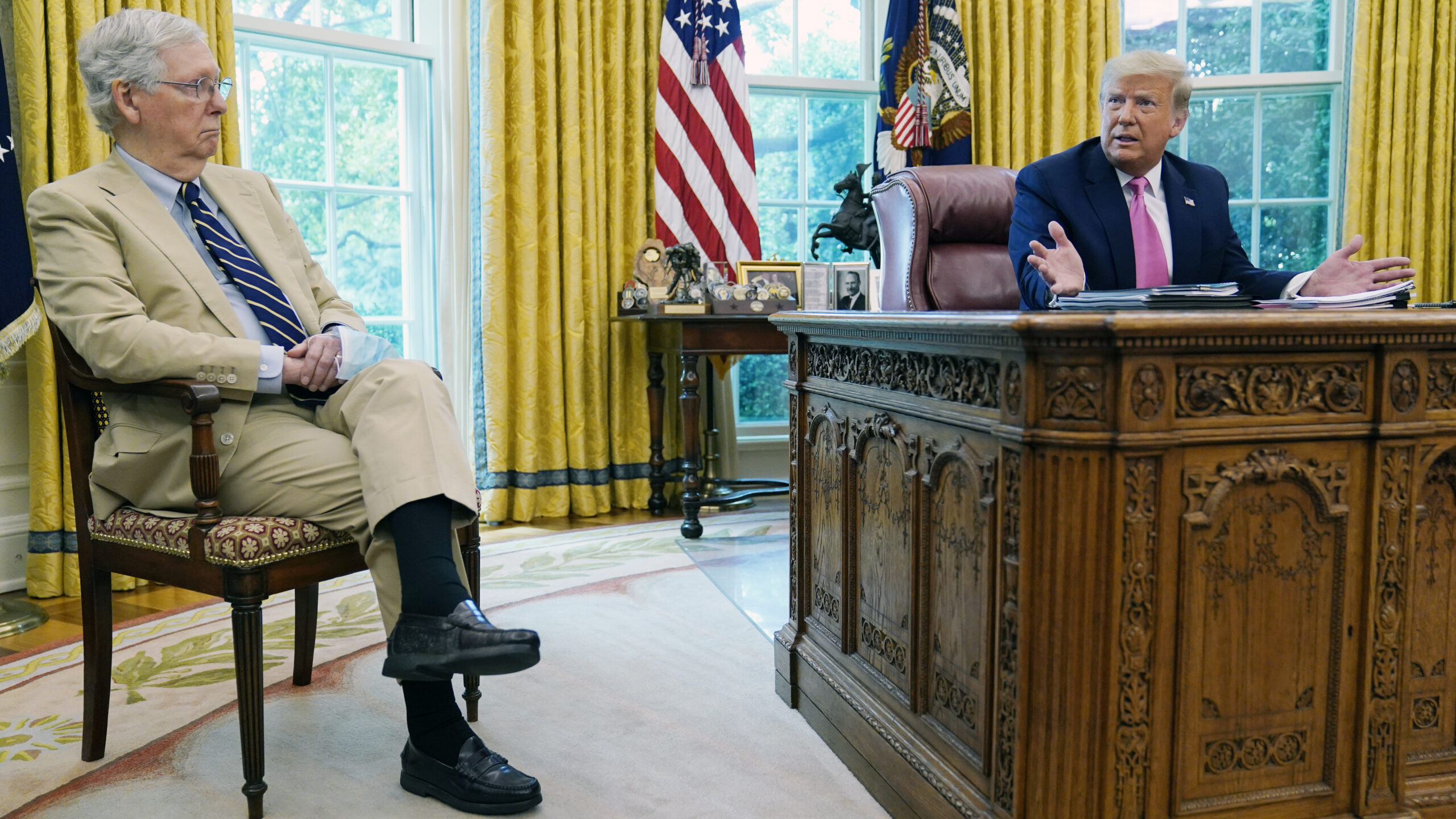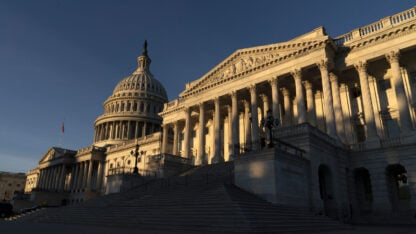After Delays, Republicans Rolled Out A New Pandemic Relief Bill. Democrats Balked

President Donald Trump meets with Senate Majority Leader Mitch McConnell, shown left, and House Minority Leader Kevin McCarthy, not shown, in the Oval Office at the White House, Monday, July 20, 2020, in Washington.
Evan Vucci / AP
Updated at 5:55 p.m. ET
After days of delays, congressional Republicans rolled out their proposal for a fifth wave of pandemic relief aid on Monday, setting the stage for a showdown with Democrats, who say the two sides remain far apart.
The plan, which was introduced by Senate Majority Leader Mitch McConnell, R-Ky., focuses on new funding for schools and a new round of payments to Americans and allows for some additional wage replacement for unemployed workers.
It also includes a marquee issue for Republicans in this relief bill: new legal protections for businesses against pandemic-related lawsuits.
“We have produced a tailored and targeted draft that will cut right to the heart of three distinct crises facing our country: getting kids back in school, getting workers back to work and winning the health care fight against the virus,” McConnell said from the Senate floor.
McConnell said the measure would be called the HEALS Act, or the Health, Economic Assistance, Liability Protection and Schools Act. Key committee chairs drafted the various components of the bill and introduced them later Monday in separate speeches on the Senate floor.
McConnell said the bill would include another round of direct payments to Americans in the same amount that was in the CARES Act that Congress passed in March — $1,200 for individuals up to an income cap, with more for families with children.
McConnell also said there would be a supplement to unemployment benefits. However, he made clear that he does not support extending the current $600 per week now in effect, saying: “We have to do it in a way that does not slow down reopening.”
Senate Finance Committee Chairman Chuck Grassley released details showing that the supplemental payment would fall to $200 per week through September and that starting in October it would be replaced with an amount that would replace 70% of lost wages through a formula created by states. Those states unable to implement a new system could apply for a waiver and continue a fixed amount for up to two months.
Republicans and Democrats have feuded over how much unemployment support should replace someone’s lost wages — at, below or more than what a worker was being paid before the economic disruption wrought by the pandemic.
In addition, McConnell indicated there would be money for schools, coronavirus testing and additional loans to small businesses, as well as legal protections for health care workers and businesses. He said the bill would also include a plan to manufacture personal protective equipment in the U.S. to avoid the need to acquire a stockpile from China.
McConnell didn’t immediately unveil the cost of the bill, but it has been estimated it will cost around $1 trillion.
Tough negotiations expected
The move sets in motion difficult negotiations for Republicans and Democrats, with the parties diverging dramatically on this new effort in coronavirus relief.
This year, Congress approved four rounds of relief aid in a matter of weeks, with talks between White House officials and Democrats cementing deals totaling about $3 trillion in aid.
Now, Democrats say Republicans should instead start with their proposal, known as the HEROES Act, approved by House Democrats more than two months ago.
Senate Minority Leader Chuck Schumer, D-N.Y., responded to McConnell with a speech of his own that faulted Republicans’ inability to settle their own positions, which he said not only wasted time but resulted in a proposal that doesn’t provide enough help. He called it “weak tea” and “too little, too late.”
Schumer mocked what he called Republicans’ fears about “big-money donors” who object to helping workers as opposed to favored big industries.
Sen. Ron Wyden, D-Ore., later called the unemployment assistance proposal “a punch in the gut and a slap in the face” to jobless Americans.
The bill includes money to design and build a new Washington, D.C., headquarters for the FBI — a project that has been debated for years and something President Trump said last week was needed because the existing building, located across the street from one of his family’s hotels, is in disrepair.
Treasury Secretary Steven Mnuchin and White House Chief of Staff Mark Meadows, a House Republican until a few months ago, are expected to meet with Schumer and House Speaker Nancy Pelosi in her office on Monday evening.
Pelosi earlier on Monday had extended the invitation to her office within 30 minutes of Republicans rolling out their proposal.
“If Republicans care about working families, this won’t take long. Time is running out. Congress cannot go home without an agreement,” Pelosi said in a statement.
Congress is slated to begin its recess Aug. 7, leaving negotiators a mere two weeks to wrap up negotiations and potentially send a bill to Trump’s desk.
9(MDAxODM0MDY4MDEyMTY4NDA3MzI3YjkzMw004))








